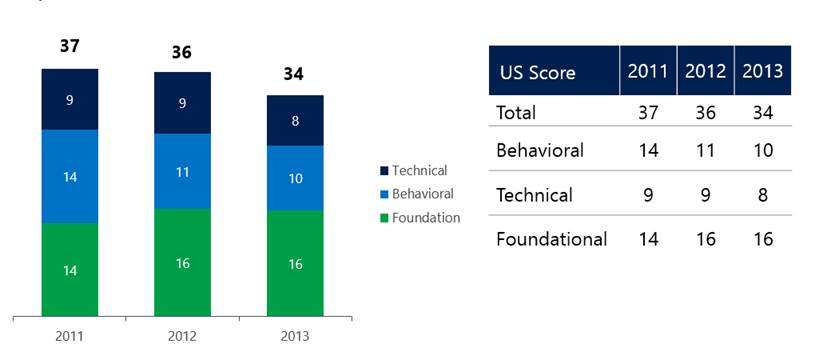From antimalware solutions and automatic updates, to firewalls and strong passwords, Microsoft and the technology industry routinely stress that consumers should exercise basic “digital hygiene.” To some, these pieces of advice come as second nature. Most U.S. consumers, however, appear to ignore key technology tools that could help them stave off issues.
New Microsoft research shows the majority of U.S. consumers are not leveraging some basic technology tools that could help them better manage their online transactions and protect their personal data. The third annual Microsoft Computing Safety Index (MCSI), a gauge to help assess consumer online habits and behaviors, shows that only 40 percent of U.S. respondents, on average, say they’ve turned on their computer’s firewall and left it on. This is down seven and 10 percentage points, respectively, from the 2012 and 2011 Indices. Data tell a similar story when consumers self-report about installing antimalware software, and turning on and running automatic updates.
The good news, however, is that U.S. consumers are actually better protected than they think they are. When walked through a self-check of certain foundational elements of PC health and maintenance, 78 percent, on average, actually reported having turned on their firewall; 92 percent were running antivirus solutions and 82 percent were using automatic updates, according to the 2013 U.S. MCSI.
These and other elements of the U.S. Index were released last week at an “@Microsoft Conversation” series event in Washington, D.C., entitled, “Online Safety: Past, Present and Future.” I had the pleasure of participating in a panel discussion moderated by Family Online Safety Institute Founder and CEO Stephen Balkam. Other panelists included: Parry Aftab, executive director of Wired Safety; Amanda Lenhart, senior researcher and director of teens and technology at Pew Research Center, and Jack McArtney, director of Corporate and Community Responsibility at Verizon.
The group discussed the evolution of online safety during the past decade-plus, including a shift in the “content” debate to one centered on user-generated content versus the blocking and filtering of adult images from years ago. When it comes to individuals’ behavior in relation to others, online bullying, harassment and other forms of unwanted “contact” garner the bulk of expert and media attention today, compared to concerns about child predators some 10 to 12 years ago, the group agreed.
We also addressed the state of online safety public awareness-raising and education in our schools, in light of a recent study by the University of New Hampshire’s Crimes Against Children Research Center. All agreed awareness-raising and formal, in-classroom education are key, but should be integrated into existing, mandatory curricula – not treated as something separate and extra for educators to learn and then teach, and for students to likely bemoan. After all, technology and constant electronic connections are already seamlessly inter-woven into our children’s lives; young people make no distinction between the online and offline worlds. It’s all simply “life.”
Turning to the future, the group’s outlook was largely positive with only a hint of caution. In addition to increasing productivity, speeding communications and, figuratively speaking, shrinking the globe, technology is altering social norms, which can be unsettling at times. Still, the group agreed a more positive, proactive approach to staying safer and more secure online is a digital imperative for all.
The MCSI for 19 other countries* as well as the 20-country worldwide average will be released on Feb. 11 in conjunction with international Safer Internet Day.
To learn more about Microsoft’s work in online safety, visit our Safety & Security Center; “like” us on Facebook and follow us on Twitter.
* In addition to the U.S., the MCSI is conducted in the following countries: Australia, Belgium, Brazil, Canada, China, Egypt, France, Germany, India, Indonesia, Japan, Korea, Malaysia, Mexico, Russia, Singapore, Spain, Turkey and the United Kingdom.


